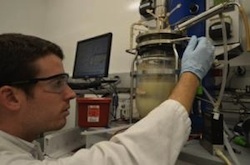University of California, Berkeley scientists may have found that using a fermentation process once used to covert starch into explosives, developed by the first president of Israel, chemist Chaim Weizmann, can be used to covert starch to biodiesel. The refined process produces a mix of products that contain more energy per gallon than ethanol, and scientists believe it could be commercialized within 5-10 years.
Although today the process is more expensive per gallon than traditional transportation fuel, it would drastically reduce greenhouse gas emissions that many researchers believe is one of the major contributors to climate change. This was a driver of the  research.
research.
“What I am really excited about is that this is a fundamentally different way of taking feedstocks – sugar or starch – and making all sorts of renewable things, from fuels to commodity chemicals like plastics,” said Dean Toste, UC Berkeley professor of chemistry and co-author of a report on the new development that will appear in the Nov. 8 issue of the journal Nature.
Weizmann’s process employs the bacterium Clostridium acetobutylicum to ferment sugars into acetone, butanol and ethanol. Dubbed ABE for the three chemicals produced, it was used by Britain to produce acetone, needed to manufacture cordite, a material used to replace gunpowder during World War I.
The research team refined the process and developed a way of extracting the acetone and butanol from the fermentation mixture while leaving most of the ethanol behind, and also developed a catalyst that converted this ideally-proportioned brew into a mix of long-chain hydrocarbons that resembles the combination of hydrocarbons in diesel fuel. Tests showed that it burned about as well as normal petroleum-based diesel fuel. Researchers believe it could be a “sweet biodiesel”.
The process is versatile enough to use a broad range of renewable starting materials, from corn sugar (glucose) and cane sugar (sucrose) to starch, and would work with non-food feedstocks such as grass, trees or field waste in cellulosic processes. Toste explained that you can tune the size of the hydrocarbons based on the reaction conditions to produce hydrocarbons typical of gasoline or longer-chain hydrocarbons in diesel and even branched chain hydrocarbons in jet fuel.
Researchers said the diesel produced via this process could initially supply niche markets, such as the military, but that renewable fuel standards in states such as California will eventually make biologically produced diesel financially viable, especially for trucks, trains and other vehicles that need more power than battery alternatives can provide. And since this diesel significantly lowers GHG emissions, the research team believes it could help reduce global warming.

